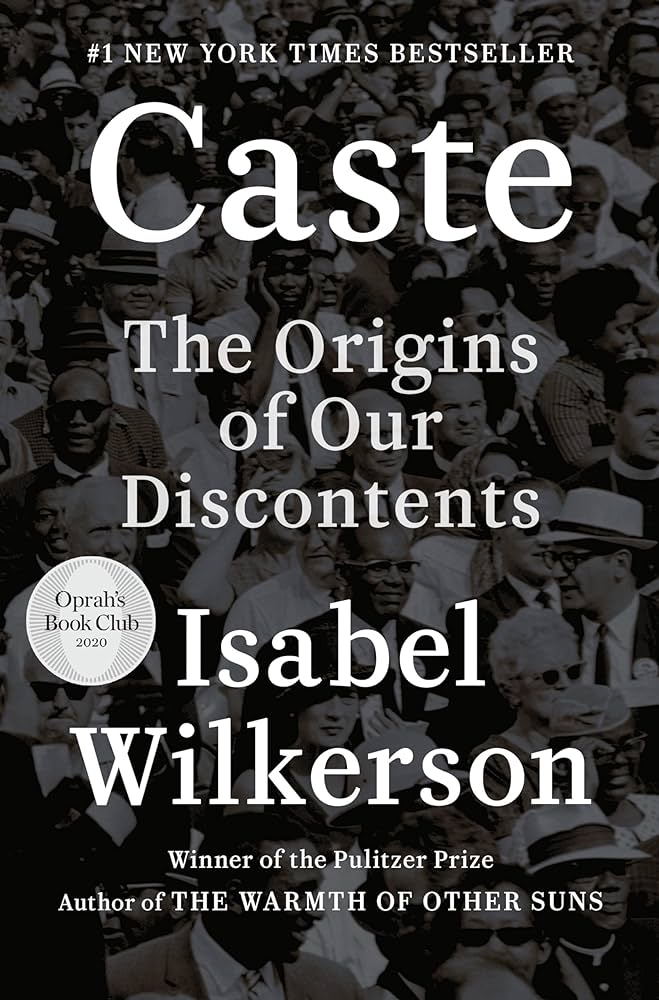Caste: The Origin of Our Discontents - Isabel Wilkerson

Author: Isabel Wilkerson
Publisher: Random House
Year of Publication: 2020
Print Length: 544 pages
Genre: Non-Fiction / Cultural Studies, Non-Fiction / Ethnic Studies, Non-Fiction / History, Non-Fiction / Law, Non-Fiction / Literary Criticism, Non-Fiction / Migration & Refugee Studies, Non-Fiction / Politics & Political Science, Non-Fiction / Race Studies, Non-Fiction / Social Science, Non-Fiction / Sociology
Topic: Activism, Class, Community, Culture & Society, Demography & Population, Diversity, Equality & Inequality, Ethnic & Ethnicity, History, Race
“As we go about our daily lives, caste is the wordless usher in a darkened theater, flashlight cast down in the aisles, guiding us to our assigned seats for a performance. The hierarchy of caste is not about feelings or morality. It is about power—which groups have it and which do not.”
In this brilliant book, Isabel Wilkerson gives us a masterful portrait of an unseen phenomenon in America as she explores, through an immersive, deeply researched, and beautifully written narrative and stories about real people, how America today and throughout its history has been shaped by a hidden caste system, a rigid hierarchy of human rankings.
Beyond race, class, or other factors, there is a powerful caste system that influences people’s lives and behavior and the nation’s fate. Linking the caste systems of America, India, and Nazi Germany, Wilkerson explores eight pillars that underlie caste systems across civilizations, including divine will, bloodlines, stigma, and more. Using riveting stories about people—including Martin Luther King, Jr., baseball’s Satchel Paige, a single father and his toddler son, Wilkerson herself, and many others—she shows the ways that the insidious undertow of caste is experienced every day. She documents how the Nazis studied the racial systems in America to plan their outcasting of the Jews; she discusses why the cruel logic of caste requires that there be a bottom rung for those in the middle to measure themselves against; she writes about the surprising health costs of caste, in depression and life expectancy, and the effects of this hierarchy on our culture and politics. Finally, she points forward to ways America can move beyond the artificial and destructive separations of human divisions, toward hope in our common humanity.
Original and revealing, Caste: The Origins of Our Discontents is an eye-opening story of people and history, and a reexamination of what lies under the surface of ordinary lives and of American life today.
Table of Contents
Part One: Toxins in the Permafrost and Heat Rising All Around
Chapter One: The Afterlife of Pathogens
The Vitals of History
Chapter Two: An Old House and an Infrared Light
Chapter Three: An American Untouchable
An Invisible Program
Part Two: The Arbitrary Construction of Human Divisions
Chapter Four: A Long-Running Play and the Emergence of Caste in
America
Chapter Five: “The Container We Have Built for You”
Chapter Six: The Measure of Humanity
Chapter Seven: Through the Fog of Delhi to the Parallels in India and
America
Chapter Eight: The Nazis and the Acceleration of Caste
Chapter Nine: The Evil of Silence
Part Three: The Eight Pillars of Caste
The Foundations of Caste: The Origins of Our Discontents
Pillar Number One: Divine Will and the Laws of Nature
Pillar Number Two: Heritability
Pillar Number Three: Endogamy and the Control of Marriage and
Mating
Pillar Number Four: Purity Versus Pollution
Pillar Number Five: Occupational Hierarchy: The Jatis and the Mudsill
Pillar Number Six: Dehumanization and Stigma
Pillar Number Seven: Terror as Enforcement, Cruelty as a Means of Control
Pillar Number Eight: Inherent Superiority Versus Inherent Inferiority
Part Four: The Tentacles of Caste
Brown Eyes Versus Blue Eyes
Chapter Ten: Central Miscasting
Chapter Eleven: Dominant Group Status Threat and the Precarity of
the Highest Rung
Chapter Twelve: A Scapegoat to Bear the Sins of the World
Chapter Thirteen: The Insecure Alpha and the Purpose of an Underdog
Chapter Fourteen: The Intrusion of Caste in Everyday Life
Chapter Fifteen: The Urgent Necessity of a Bottom Rung
Chapter Sixteen: Last Place Anxiety: Packed in a Flooding Basement
Chapter Seventeen: On the Early Front Lines of Caste
Chapter Eighteen: Satchel Paige and the Illogic of Caste
Part Five: The Consequences of Caste
Chapter Nineteen: The Euphoria of Hate
Chapter Twenty: The Inevitable Narcissism of Caste
Chapter Twenty-one: The German Girl with the Dark, Wavy Hair
Chapter Twenty-two: The Stockholm Syndrome and the Survival of the Subordinate Caste
Chapter Twenty-three: Shock Troops on the Borders of Hierarchy
Chapter Twenty-four: Cortisol, Telomeres, and the Lethality of Caste
Part Six: Backlash
Chapter Twenty-five: A Change in the Script
Chapter Twenty-six: Turning Point and the Resurgence of Caste
Chapter Twenty-seven: The Symbols of Caste
Chapter Twenty-eight: Democracy on the Ballot
Chapter Twenty-nine: The Price We Pay for a Caste System
Part Seven: Awakening
Chapter Thirty: Shedding the Sacred Thread
The Radicalization of the Dominant Caste
Chapter Thirty-one: The Heart Is the Last Frontier
Epilogue: A World Without Caste
Dedication
Acknowledgments
Notes
Bibliography
By Isabel Wilkerson
About the Author

Isabel Wilkerson is known for chronicling the lives of unsung African Americans and exposing deeply embedded systems of social injustice in her reporting for The New York Times and in her celebrated works of nonfiction: Caste: The Origins of Our Discontents (2020) and The Warmth of Other Suns: The Epic Story of America’s Great Migration (2010). She was the first African American woman to win the Pulitzer Prize for journalism (1994)
Source: https://www.britannica.com/biography/Isabel-Wilkerson
More from Isabel Wilkerson in this library, click here.
